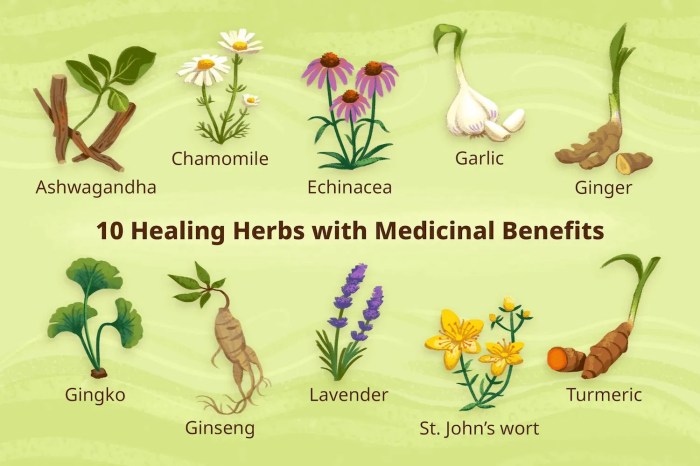
How to incorporate herbal remedies into daily routines takes center stage, beckoning readers into a world of wellness and natural healing. This guide offers a comprehensive look at integrating herbal remedies for a healthier lifestyle.
Explore the benefits, methods, and considerations of using herbal remedies to enhance overall well-being.
Wellness Programs
Wellness programs are comprehensive initiatives designed to improve and maintain overall health and well-being. These programs typically encompass various aspects of health, including physical, emotional, and mental well-being, with a focus on prevention and holistic approaches to wellness.
Popular Wellness Programs Incorporating Herbal Remedies
- One popular wellness program that incorporates herbal remedies is Ayurveda, an ancient Indian system of medicine that uses herbs and natural remedies to promote balance and harmony within the body.
- Another example is Traditional Chinese Medicine (TCM), which includes herbal remedies such as ginseng, ginger, and ginkgo biloba to address a wide range of health issues.
- Many modern wellness programs also incorporate herbal supplements and remedies, such as those based on scientific research supporting the efficacy of herbs like turmeric, echinacea, and garlic in promoting health.
Herbal remedies play a crucial role in wellness programs by providing natural and holistic solutions to support the body’s functions and overall well-being.
Herbal Remedies
Herbal remedies are natural plant-based solutions that have been used for centuries in traditional medicine practices around the world. These remedies are known for their holistic approach to healing and their ability to address a wide range of health concerns.
Forms of Consumption
Herbal remedies can be consumed in various forms, including:
- Teas: Herbal teas are a popular way to enjoy the benefits of herbs. They can be soothing, energizing, or used to address specific health issues.
- Supplements: Herbal supplements come in the form of capsules, tablets, or powders, providing a convenient way to incorporate herbs into your daily routine.
- Tinctures: Tinctures are liquid herbal extracts that can be added to water or other beverages for easy consumption.
Effectiveness Comparison
When it comes to certain health concerns, herbal remedies are often favored for their gentle yet effective approach compared to pharmaceutical options. While pharmaceuticals may provide quick relief, herbal remedies are known for addressing root causes and promoting long-term wellness.
Additionally, herbal remedies are generally considered safer with fewer side effects, making them a popular choice for those looking for natural alternatives to traditional medicine.
Skin Health

When it comes to skin health, herbal remedies can play a significant role in improving various aspects such as reducing inflammation and promoting collagen production.
Herbs for Skin Health
There are several herbs known for their skin-enhancing properties that can be incorporated into skincare routines:
- Calendula:Known for its anti-inflammatory and antiseptic properties, calendula can help soothe irritated skin and promote healing.
- Lavender:Lavender is often used for its calming effects on the skin and can help reduce redness and irritation.
- Chamomile:Chamomile has anti-inflammatory and antioxidant properties that can help with skin conditions like eczema and acne.
- Aloe Vera:Aloe vera is well-known for its moisturizing and healing properties, making it a popular choice for soothing sunburns and promoting skin regeneration.
Considerations for Using Herbal Remedies, How to incorporate herbal remedies into daily routines
While herbal remedies can be beneficial for skin health, it is essential to consider potential side effects or interactions:
- Always perform a patch test before using a new herbal remedy to check for any allergic reactions.
- Consult with a healthcare professional or dermatologist before incorporating herbal remedies, especially if you have sensitive skin or existing skin conditions.
- Be mindful of the quality and source of the herbs used to ensure effectiveness and safety.
Bone Density
When it comes to bone health, incorporating herbal remedies into your daily routine can play a significant role in improving bone density. These remedies can provide essential nutrients that support bone strength and help prevent conditions like osteoporosis.
Herbs and Supplements for Bone Health
There are several specific herbs and supplements known for their benefits in improving bone density and overall bone health. Here are some of the most effective ones:
- Calcium:Calcium is crucial for maintaining strong bones and preventing bone loss. Incorporate calcium-rich herbs like nettle leaf, horsetail, and oatstraw into your routine.
- Vitamin D:Vitamin D is essential for calcium absorption and bone mineralization. Herbs like dandelion, chamomile, and turmeric can provide a natural source of Vitamin D.
- Magnesium:Magnesium plays a key role in bone formation and density. Herbs like kelp, burdock root, and alfalfa are rich sources of magnesium.
Integrating Herbal Remedies into Daily Routine
Here are some tips on how you can easily incorporate these herbal remedies into your daily routine to support bone density:
- Herbal Teas:Start your day with a cup of herbal tea containing bone-strengthening herbs like nettle leaf or oatstraw.
- Smoothies:Add powdered forms of calcium-rich herbs like horsetail or dandelion to your morning smoothies for an added bone health boost.
- Cooking:Use herbs like turmeric and kelp in your cooking to enhance the flavor of your dishes while promoting bone health.
Muscle Mass

Herbal remedies can play a significant role in enhancing muscle mass development and aiding in muscle recovery. By incorporating herbs rich in protein and other essential nutrients into your daily routine, you can support muscle growth and improve overall performance.
Herbs for Muscle Mass
- One key herb known for its muscle-building properties is Ashwagandha. This adaptogenic herb helps reduce muscle inflammation and promotes muscle strength.
- Ginseng is another herb that can aid in muscle recovery by reducing oxidative stress and improving endurance.
- Tribulus Terrestris is a herb that can enhance muscle mass by boosting testosterone levels, which is essential for muscle growth.
Epilogue
In conclusion, incorporating herbal remedies into your daily routine can lead to a more balanced and vibrant life. By embracing these natural solutions, you can nurture your body and mind in a harmonious way.
Query Resolution: How To Incorporate Herbal Remedies Into Daily Routines
Can herbal remedies replace pharmaceutical options entirely?
While herbal remedies can be effective for certain health concerns, they may not always replace pharmaceutical options entirely. It’s best to consult with a healthcare provider for personalized advice.
Are there any risks associated with using herbal remedies for skin health?
Some individuals may experience allergic reactions or skin irritation when using certain herbal remedies. It’s important to do a patch test before widespread use and consult with a dermatologist if needed.
How long does it usually take to see the effects of herbal remedies on bone density?
The time it takes to see improvements in bone density with herbal remedies can vary depending on individual factors. Consistent use over several weeks to months is typically recommended for noticeable results.





